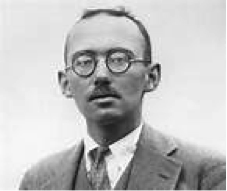 Stephen Vincent Benét was an American writer who packed a great deal into his relatively short lifetime which spanned the first half of the 20th century. Remarkably he had his first collection of poems published when aged only 17 and his final, epic piece of work (Western Star), won him the Pulitzer Prize even though it was unfinished when he died in 1943. The award was posthumous and recognised the significance of Benét’s view that the dominant force in American history up to that time was the frontier.
Stephen Vincent Benét was an American writer who packed a great deal into his relatively short lifetime which spanned the first half of the 20th century. Remarkably he had his first collection of poems published when aged only 17 and his final, epic piece of work (Western Star), won him the Pulitzer Prize even though it was unfinished when he died in 1943. The award was posthumous and recognised the significance of Benét’s view that the dominant force in American history up to that time was the frontier.
He was born in July 1898 in the town of Bethlehem, Pennsylvania. Benét’s family history was pretty much military-based. His father was a Colonel in the US Army and his mother came from a military family in Kentucky. Almost inevitably, Stephen was sent to a military academy with his parents, no doubt, hoping that he would continue the family tradition of soldiering. Perhaps he was too young, having been sent there at the age of ten. He just did not take to the environment, disliking the overt brutality of the place. He later wrote a poem about school brutality, substituting the poet Shelley for himself. It included the following lines:

Despite his bad experiences at the Academy he did try to get into the Army but was turned down due to defective vision. Reading good literature was very much part of Stephen’s home life and both parents actively encouraged him to read and write. His first collection of poetry was published in 1915 with the title Five Men and Pompey and was influenced both by other modern realism poets and romantic ones like William Morris.
By 1919 Benét was onto his THIRD collection of poetry and he graduated with an MA from Yale University with this collection being his chosen thesis. He went on to be a successful novelist as well as a poet and, later did some screenwriting for Hollywood movies. He spent time in France between 1921 and 1923 and it was here that he met another writer who was to become his wife (Rosemary Carr).
One of his novels was a historical tale about Florida in the 18th century and harked back to the time when his ancestors settled there. His grandfather originated from the Spanish island of Minorca and the novel Spanish Bayonet (published 1926) was all about this period of history. He also had a keen interest in the American Civil War and it was while he was once again resident in France that he wrote his Pulitzer Prize-winning poem, called John Brown’s Body. It was a powerful piece of writing focusing on the war but not from a soldier’s point of view. Instead it was a war story seen through the eyes of a young, small town boy and included the lines:

One of Benét’s most significant pieces of work though was American Names which ended in the famous lines:

That last line was a reference to an infamous event in American history where the last engagement between American soldiers and Native American Indians took place. Wounded Knee was a South Dakota reservation village which saw an estimated 150 Indian men, women and children massacred, apparently by mistake.
Stephen Vincent Benét suffered a heart attack while in New York City in March 1943. He died, aged 44.

